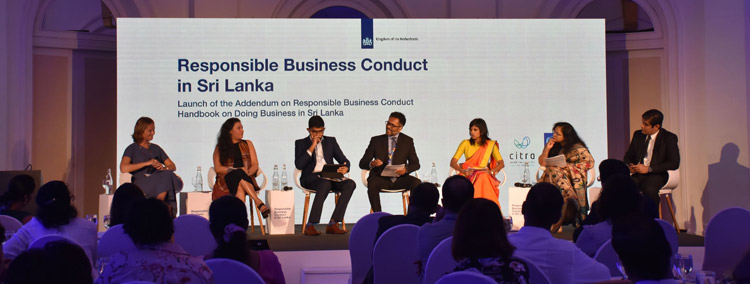November, 11, 2022

Launch of the Addendum on Responsible Business Conduct Handbook on Doing Business in Sri Lanka
Responsible Business Conduct (RBC) as defined by the OECD Guidelines for Multinational Enterprises revolves around the key principle of due diligence, which means the responsibility of businesses to identify, prevent, mitigate, and report on risks related to their operations, products, and services. To highlight its importance and create a conversation around RBC, the Embassy of the Kingdom of the Netherlands launched the ‘Addendum on RBC Handbook on Doing Business in Sri Lanka’ yesterday in Colombo, Sri Lanka facilitated by the Citra Social Innovation Lab of the United Nations Development Programme (UNDP) in Sri Lanka, which saw the participation of high-level representatives followed by a dialogue around RBC in Sri Lanka’s context by expert panelists.
The Handbook on Doing Business in Sri Lanka provides guidance on RBC for entrepreneurs and businesses. Adhering to RBC standards is critical for exporters from Sri Lanka to the European Union and the Netherlands to stay competitive and retain access to EU markets. The Addendum compiles essential information to understand RBC, the frameworks, and actions supporting it, as well as step-by-step guidance on incorporating RBC in business operations and practices, managing risks, and accessing tools, guidelines, and relevant information.
Delivering the keynote speech at the event, Nanna Stolze of the International RBC Unit, Department for Market Regulation and Trade Policy, Ministry of Foreign Affairs, Netherlands, provided an overview of what RBC is in the Dutch context and why it is important.
Speaking at the event, Anouk Baron, Deputy Ambassador of the Embassy of the Kingdom of the Netherlands mentioned, “To survive and build a better future, the era of bigger is better, take, make, dispose and exponential growth should be replaced with a greater focus on quality, sustainability and a move towards understanding what footprint or impact a business creates throughout its entire supply chain. We have a choice, an opportunity but also an obligation to collectively deliver on that demand as citizens, consumers, producers and policy makers.” She also went on to highlight how the Embassy aims to support businesses in Sri Lanka to prepare and embrace the shift towards RBC.
Highlighting the role of the Government of Sri Lanka, Chamindry Saparamadu, Director General of the Sustainable Development Council stated, “We have prioritized the private sector in our work at our institution and have developed a framework of private sector engagement on sustainability with a steering committee appointed to operationalize this framework with representatives from main business chambers. One of the main elements of this framework is promoting inclusive and sustainable business models through standardization, certification and reporting… Given that the Sri Lankan economy is predominantly based on SMEs, our approach is to see an industry-wide adoption of all these standards in a phased out approach to ensure a wider adoption of these standards”
The panel on Responsible Business Conducted consisted of sector experts including Shiran Fernando, Chief Economist of Ceylon Chamber of Commerce; Simrin Singh, Country Director of ILO Sri Lanka; Myanthi Peiris, Business and Human Rights National Specialist of UNDP Sri Lanka; Shehan Liyanage of SLYCAN Trust (GTE) Ltd and was moderated by Murali Kanapathy, Senior Programme and Operation Officer, Better Work Programme of ILO Sri Lanka.
The dialogue, which was facilitated by the Citra Social Innovation Lab, is a part of their wider service offerings to development partners. Citra uses human centered design approaches and innovation tools such as design thinking and systemic design to ensure holistic approaches to achieve the desired impact.
Video Story